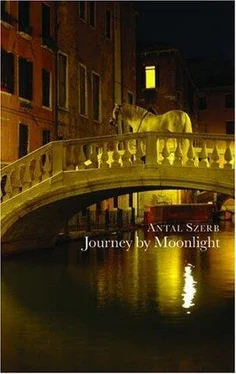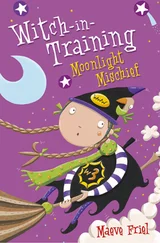“Look, Ervin, of our two lives yours is the more remarkable. My curiosity is by rights stronger than yours. You must tell me your story first … ”
“What is there to tell, my dear Mishy? We have no personal story. The life of any one monk is the same as any other, and you can read the sum of those lives in the history of the church.”
“But tell me, at any rate, how you came here to Gubbio.”
“At first I remained back home, in Hungary. I was a novice in Gyöngyös, then for a long time at the monastery in Eger. Then the Hungarian branch of the Order had to send a father to Rome on some business, and I was chosen because I had been learning Italian. Then, some time after I had dealt with that, I was called to Rome again, because they had taken a great liking to me, though I certainly didn’t deserve it, and they wanted to keep me there to work with the Pater Prior. But I was concerned that this might lead, in due course, to my making a career, purely in the Franciscan context, naturally — becoming the head of a house somewhere, or filling some rank at Head Office. And that I didn’t want. So I asked Pater Prior to place me here in Gubbio.”
“Why here, exactly?”
“I really couldn’t say. Perhaps because of the old legend, the one about the wolf of Gubbio we were so fond of at school, you remember. Because of the legend I came here once on a visit from Assisi and fell in love with the monastery. This is the place, you know, where no bird flies … ”
“And you’re happy here?”
“Very. As the years go by I feel a greater sense of peace … but I mustn’t patter on” (a strange little smile put quotation marks around the phrase) “because I know that you didn’t come here to see Pater Severinus, but the person who used to be Ervin, not so?”
“I really don’t know … tell me … these are difficult questions to ask … isn’t it rather monotonous here?”
“Not in the least. Our lives have the same pleasures and pains as those outside, only the terms are different, and the emphasis is on other things.”
“Why don’t you want a career in the Order? Is that from humility?”
“Not because of that. The kind of office I could attain would be consistent with the ideal of humility, or rather, would give the opportunity to overcome pride. No, I refused a career for quite other reasons. Really, because any advancement would not have been due to my being a good monk but for the sort of qualities I brought with me from the outside world, and in fact from my ancestors — my ability with languages and the fact that I can sometimes deal with matters more quickly and effectively than some of my fellow monks. In a word, my Jewish qualities. And I didn’t want that.”
“Tell me, Ervin, how do your fellow monks look on the fact that you were Jewish? Hasn’t that been a disadvantage?”
“Not at all. It worked only to my benefit. I did run into individual fellow-monks who made it clear how much they disliked my race, but that just presented opportunities to practise meekness and self-control. And then in Hungary, when I was a country pastor, the fact always somehow got about, and the good village faithful saw me as some sort of oddity and paid much greater attention to what I said. Here in Italy nobody bothers about it. I hardly ever think about it myself.”
“Tell me, Ervin … what do you actually do all day? What work is there for you?”
“A great deal. Chiefly prayers and spiritual exercises.”
“You don’t write any more? … ”
Again Ervin smiled.
“No, not for a long time now. You see, it is true that when I first joined the Order I imagined that I would serve the Church with my pen, I would be a Catholic poet … But later … ”
“What? Your inspiration left you?”
“Not at all. I left it. I realised it was all really beside the point.”
Mihály thought deeply. He was beginning to understand what sort of worlds separated him from Father Severinus, who had been Ervin … “How long have you been in Gubbio?” he asked eventually.
“Wait a moment … it must be … six years. But it could be seven.”
“Tell me, Ervin, I used to think about this a lot, if you remember. Do you monks also have the feeling that time goes forward, and that every little bit of it has a special truth? Do you have a sense of history? If you recall some event, can you say if it happened in 1932 or in 1933?”
“No. It is one of the blessings of our lot that God lifts us out of time.”
Ervin began to cough violently. Mihály realised only then that he had been coughing for some time, a dry, ugly cough.
“Tell me, Ervin, isn’t there something wrong with your lungs?”
“Well, they’re certainly not in perfect order … in fact you could say they’re in a pretty bad way. You know, we Hungarians are really pampered. Houses in Hungary are so well-heated. These Italian buildings really wear you down, always in unheated cells and cold churches … and in sandals on the stone floor … and this cowl doesn’t warm you very much.”
“Ervin, you’re ill … aren’t they treating you?”
“You’re very good, Mihály, but you mustn’t grieve about it,” he said, coughing. “You see, it’s simply a blessing for me, being ill. Because of it they agreed that I could leave Rome to come here to Gubbio, where the air is so healthy. Perhaps I really will get better. Then again, physical suffering is part of our monastic system. Others have to mortify the body — in my case the body takes care of this itself … But let’s leave all this. You came here to talk about yourself. We shouldn’t be wasting precious time on things neither you nor I can do anything about.”
“But Ervin, it’s not as if … you shouldn’t live like that, and you should go somewhere where they looked after you, and made you drink your milk, and lie in the sun.”
“Don’t worry about it, Mihály. Perhaps the time for that will come. Even monks have to guard against death, because if we simply allow the illness to take us over it would be a form of suicide. If the problem gets serious, I really will see a doctor … but we’re still a long way from that, believe me. And now you must talk. Tell me everything that’s happened to you since I last saw you. And first of all, tell me how you found me.”
“János Szepetneki said you were somewhere in Umbria, he didn’t know where precisely. And some unusual chance happenings, some really strong indications, made me suspect that you were in Gubbio, and indeed the famous Father Severinus.”
“Well, I am Father Severinus. And now tell me about yourself. I’m all attention.”
He rested his head in his hand in the classical pose of the father-confessor, and Mihály began to speak, haltingly at first, and with difficulty, though Ervin’s questions were a wonderful help. “But that long experience of the confessional is quite wasted on me,” Mihály thought to himself, for he could never have withheld the outpouring that was just waiting to burst from him. As he spoke it all came to the surface — everything that since his escape had lived inside him like a repressed instinct: how deeply he felt a failure in his adult, or quasi-adult life, his marriage, his desperation to know where he might start again, what he could expect from the future, how he could get back to his true self. And above all, how he was tortured by nostalgia for his youth and the friends of his youth.
When he reached this point the strength of his emotion overwhelmed him and his voice broke. He was filled with self-pity, and at the same time ashamed of his own sentimentality before Ervin, before Ervin’s mountain-peak serenity. Then he suddenly burst out in shocked amazement:
“And you? How can you bear it? Doesn’t it upset you too? Don’t you miss them? How do you manage it?”
Читать дальше












